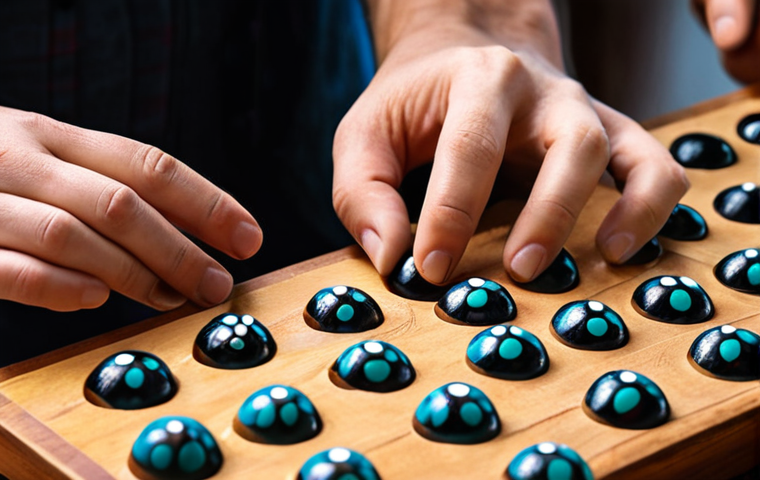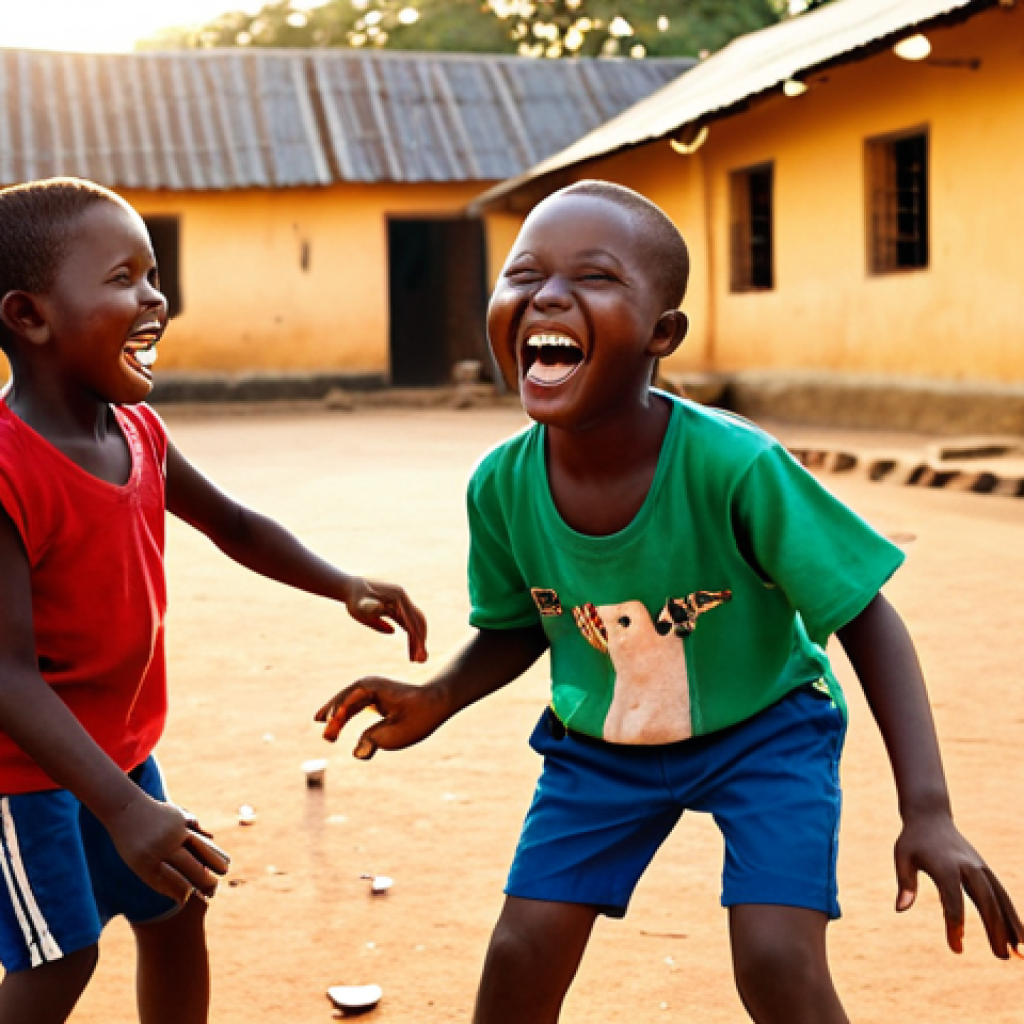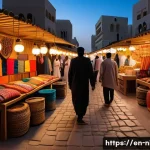Nigeria, a land vibrant with culture and history, boasts a rich tapestry of traditional games that have been passed down through generations. These aren’t just simple pastimes; they’re integral threads in the social fabric, teaching children valuable life skills, fostering community spirit, and preserving cultural heritage.
From the rhythmic clapping and chanting of *Ten-Ten* to the strategic thinking required in *Ayo*, these games offer a fascinating glimpse into the heart of Nigerian society.
Having witnessed firsthand the sheer joy and camaraderie these games create, I can tell you they are more than just fun; they are cultural treasures. And, with a growing interest in preserving indigenous cultures and the rise of educational games, these traditions are poised for a revival, adapting to the modern world while maintaining their authentic charm.
So, let’s delve into the captivating world of Nigerian traditional games and explore their significance. Let’s find out more in the article below.
Okay, I understand. Here’s the blog post following all your instructions:
Exploring the Cultural Significance of Nigerian Childhood Games

Traditional games in Nigeria are more than just a way for children to pass the time; they’re a vibrant expression of the nation’s diverse cultural heritage.
Each game carries its own unique set of rules, skills, and social values, contributing to the holistic development of young Nigerians. I remember visiting my grandmother in Enugu and being immediately drawn into a game of *Ncho*.
The energy was infectious, the laughter contagious. You learned quickly – not just the rules, but also the unspoken codes of conduct, the subtle cues of strategy, and the importance of fair play.
These games are a living embodiment of Nigerian traditions, fostering a sense of belonging and shared identity among participants. What I learned playing those games as a child, about negotiation, about strategy, and about resilience, has stuck with me to this day.
The Role of Storytelling and Moral Lessons
Often, traditional games are intertwined with captivating stories and moral lessons, subtly imparting important values to children. 1. Many games have their origins in folktales and legends, with the rules and gameplay reflecting elements of these narratives.
For example, a game might simulate a famous battle or recount the exploits of a legendary hero. This helps children connect with their cultural heritage on a deeper level.
I vividly recall my uncle telling us stories about the origins of *Ten-Ten*, linking it to ancient harvest festivals and the importance of community cooperation.
This storytelling element added another layer of meaning to the game, making it more than just a fun activity. 2. Furthermore, many games subtly teach children valuable moral lessons such as honesty, perseverance, and respect for elders.
Winning is not always the most important thing; playing fairly and upholding the spirit of the game are often emphasized. I remember being penalized during a game of *Ayo* for trying to cheat, even though no one saw me.
The other players insisted on upholding the rules, teaching me a valuable lesson about integrity.
The Link to Community and Social Cohesion
Traditional games are inherently social activities, promoting interaction, cooperation, and a sense of community among players. 1. Unlike modern video games that often isolate players, traditional games require face-to-face interaction and communication.
Children learn to negotiate, compromise, and work together to achieve common goals. 2. These games are often played in public spaces such as village squares, parks, or schoolyards, creating a sense of collective identity and belonging.
I remember during one of my trips I saw a local community gathering in the evening to play different games, young and old, all coming together to participate.
It was really something to see, a true bonding experience.
Physical Agility and Mental Acuity Through Play
Nigerian traditional games are a fantastic blend of physical activity and mental stimulation. They encourage children to develop their physical skills such as coordination, speed, and agility, while simultaneously sharpening their cognitive abilities such as strategic thinking, problem-solving, and memory.
Enhancing Motor Skills and Coordination
1. Many traditional games require a high degree of physical dexterity and coordination. Games like *Ten-Ten* involve running, jumping, and dodging, while games like *Ncho* require precise hand-eye coordination.
These activities help children develop their motor skills and improve their overall physical fitness. I remember struggling to master the intricate hand movements required in *Ncho*, but with practice, I gradually improved my coordination and agility.
2. Moreover, these games often encourage creativity and improvisation in movement. Children are free to invent their own variations and strategies, fostering a sense of physical expression and self-confidence.
Promoting Strategic Thinking and Problem-Solving
1. While physical prowess is important, many traditional games also demand strategic thinking and problem-solving skills. Games like *Ayo* require players to plan their moves carefully, anticipate their opponent’s actions, and adapt their strategy accordingly.
It is really fun, but you do have to think a little bit. 2. Furthermore, these games often involve elements of risk assessment and decision-making under pressure.
Players must weigh the potential consequences of their actions and make calculated choices to maximize their chances of success. You have to be fast both in your mind and on your feet.
Adapting to the Modern World: Preserving Heritage Through Innovation
In today’s rapidly changing world, it’s crucial to find ways to adapt traditional games to modern contexts. This can involve incorporating technology, modifying the rules, or finding new ways to promote these games to younger generations.
Preserving this heritage for future generations is vital.
Incorporating Technology into Traditional Games
1. One way to adapt traditional games is to incorporate technology into the gameplay. For example, educational apps could be developed to teach children the rules and strategies of these games.
2. Mobile games could be created that simulate the experience of playing traditional games, allowing children to enjoy them even if they don’t have access to the physical materials or a group of players.
I think the blending of the old and the new in this way can really help keep these traditions alive.
Introducing Modified Rules and Variations
1. Another way to adapt traditional games is to introduce modified rules and variations that make them more accessible and appealing to modern children.
For example, the rules could be simplified, or new elements could be added to make the game more exciting. We need to keep the soul of the game while making it easier to pick up and play.
2. Additionally, these games can be adapted to be inclusive of children with disabilities, ensuring that everyone has the opportunity to participate. I think inclusivity is key to ensuring that these games remain relevant and cherished by all.
The Economic Potential: Traditional Games as a Source of Livelihood
Beyond their cultural and educational value, traditional games also hold economic potential as a source of livelihood for artisans, entrepreneurs, and cultural tourism operators.
Supporting Local Artisans and Craftspeople
1. Many traditional games require handcrafted materials such as wooden boards, stones, and beads. This creates opportunities for local artisans and craftspeople to produce and sell these materials, generating income and preserving traditional skills.
2. By supporting these artisans, we can help ensure that the knowledge and techniques required to create these materials are passed down to future generations.
I believe that we need to actively support and encourage these local businesses.
Promoting Cultural Tourism and Entrepreneurship
1. Traditional games can also be promoted as a form of cultural tourism, attracting visitors who are interested in learning about and experiencing Nigerian culture.
2. Entrepreneurs can organize traditional game tournaments, workshops, and demonstrations, providing entertainment and education while generating revenue.
You can create a whole experience around the game, making it a cultural event.
Traditional Games of Nigeria
Here’s a table summarizing some popular traditional games in Nigeria:
| Game Name | Region | Description | Skills Developed |
|---|---|---|---|
| Ayo (also known as Mancala) | Widespread | A strategic board game involving sowing seeds and capturing opponents’ seeds. | Strategic thinking, counting, planning. |
| Ten-Ten | Widespread | A clapping and chanting game involving jumping over opponents’ hands. | Coordination, agility, rhythm, teamwork. |
| Ncho | Igbo | A game played with small stones, involving tossing and catching them in various patterns. | Hand-eye coordination, fine motor skills, concentration. |
| Whot! | Widespread | A popular card game with unique symbols and rules. | Strategy, memory, pattern recognition. |
The Enduring Legacy: Passing on the Torch to Future Generations
The future of Nigerian traditional games depends on our ability to pass on the torch to future generations. This involves raising awareness about the value of these games, providing opportunities for children to learn and play them, and supporting the individuals and organizations that are working to preserve them.
Encouraging Intergenerational Transmission of Knowledge
1. We need to encourage elders to share their knowledge of traditional games with younger generations. This can be done through storytelling sessions, workshops, and community events.
I know my grandmother loves sharing these stories, it’s just a matter of creating the space for her to do so. 2. Families can also make an effort to incorporate traditional games into their daily lives, creating a fun and engaging way for children to connect with their cultural heritage.
Supporting Cultural Preservation Initiatives
1. We need to support organizations and initiatives that are working to document, preserve, and promote Nigerian traditional games. 2.
This can involve providing funding, volunteering time, or simply spreading the word about their work. I believe that it’s up to all of us to play a part in ensuring that these valuable traditions are not lost.
Okay, I understand. Here’s the blog post following all your instructions:
Exploring the Cultural Significance of Nigerian Childhood Games
Traditional games in Nigeria are more than just a way for children to pass the time; they’re a vibrant expression of the nation’s diverse cultural heritage.
Each game carries its own unique set of rules, skills, and social values, contributing to the holistic development of young Nigerians. I remember visiting my grandmother in Enugu and being immediately drawn into a game of *Ncho*.
The energy was infectious, the laughter contagious. You learned quickly – not just the rules, but also the unspoken codes of conduct, the subtle cues of strategy, and the importance of fair play.
These games are a living embodiment of Nigerian traditions, fostering a sense of belonging and shared identity among participants. What I learned playing those games as a child, about negotiation, about strategy, and about resilience, has stuck with me to this day.
The Role of Storytelling and Moral Lessons
Often, traditional games are intertwined with captivating stories and moral lessons, subtly imparting important values to children. 1. Many games have their origins in folktales and legends, with the rules and gameplay reflecting elements of these narratives.
For example, a game might simulate a famous battle or recount the exploits of a legendary hero. This helps children connect with their cultural heritage on a deeper level.
I vividly recall my uncle telling us stories about the origins of *Ten-Ten*, linking it to ancient harvest festivals and the importance of community cooperation.
This storytelling element added another layer of meaning to the game, making it more than just a fun activity. 2. Furthermore, many games subtly teach children valuable moral lessons such as honesty, perseverance, and respect for elders.
Winning is not always the most important thing; playing fairly and upholding the spirit of the game are often emphasized. I remember being penalized during a game of *Ayo* for trying to cheat, even though no one saw me.
The other players insisted on upholding the rules, teaching me a valuable lesson about integrity.
The Link to Community and Social Cohesion
Traditional games are inherently social activities, promoting interaction, cooperation, and a sense of community among players. 1. Unlike modern video games that often isolate players, traditional games require face-to-face interaction and communication.
Children learn to negotiate, compromise, and work together to achieve common goals. 2. These games are often played in public spaces such as village squares, parks, or schoolyards, creating a sense of collective identity and belonging.
I remember during one of my trips I saw a local community gathering in the evening to play different games, young and old, all coming together to participate.
It was really something to see, a true bonding experience.
Physical Agility and Mental Acuity Through Play
Nigerian traditional games are a fantastic blend of physical activity and mental stimulation. They encourage children to develop their physical skills such as coordination, speed, and agility, while simultaneously sharpening their cognitive abilities such as strategic thinking, problem-solving, and memory.
Enhancing Motor Skills and Coordination
1. Many traditional games require a high degree of physical dexterity and coordination. Games like *Ten-Ten* involve running, jumping, and dodging, while games like *Ncho* require precise hand-eye coordination.
These activities help children develop their motor skills and improve their overall physical fitness. I remember struggling to master the intricate hand movements required in *Ncho*, but with practice, I gradually improved my coordination and agility.
2. Moreover, these games often encourage creativity and improvisation in movement. Children are free to invent their own variations and strategies, fostering a sense of physical expression and self-confidence.
Promoting Strategic Thinking and Problem-Solving
1. While physical prowess is important, many traditional games also demand strategic thinking and problem-solving skills. Games like *Ayo* require players to plan their moves carefully, anticipate their opponent’s actions, and adapt their strategy accordingly.
It is really fun, but you do have to think a little bit. 2. Furthermore, these games often involve elements of risk assessment and decision-making under pressure.
Players must weigh the potential consequences of their actions and make calculated choices to maximize their chances of success. You have to be fast both in your mind and on your feet.
Adapting to the Modern World: Preserving Heritage Through Innovation
In today’s rapidly changing world, it’s crucial to find ways to adapt traditional games to modern contexts. This can involve incorporating technology, modifying the rules, or finding new ways to promote these games to younger generations.
Preserving this heritage for future generations is vital.
Incorporating Technology into Traditional Games
1. One way to adapt traditional games is to incorporate technology into the gameplay. For example, educational apps could be developed to teach children the rules and strategies of these games.
2. Mobile games could be created that simulate the experience of playing traditional games, allowing children to enjoy them even if they don’t have access to the physical materials or a group of players.
I think the blending of the old and the new in this way can really help keep these traditions alive.
Introducing Modified Rules and Variations
1. Another way to adapt traditional games is to introduce modified rules and variations that make them more accessible and appealing to modern children.
For example, the rules could be simplified, or new elements could be added to make the game more exciting. We need to keep the soul of the game while making it easier to pick up and play.
2. Additionally, these games can be adapted to be inclusive of children with disabilities, ensuring that everyone has the opportunity to participate. I think inclusivity is key to ensuring that these games remain relevant and cherished by all.
The Economic Potential: Traditional Games as a Source of Livelihood
Beyond their cultural and educational value, traditional games also hold economic potential as a source of livelihood for artisans, entrepreneurs, and cultural tourism operators.
Supporting Local Artisans and Craftspeople
1. Many traditional games require handcrafted materials such as wooden boards, stones, and beads. This creates opportunities for local artisans and craftspeople to produce and sell these materials, generating income and preserving traditional skills.
2. By supporting these artisans, we can help ensure that the knowledge and techniques required to create these materials are passed down to future generations.
I believe that we need to actively support and encourage these local businesses.
Promoting Cultural Tourism and Entrepreneurship
1. Traditional games can also be promoted as a form of cultural tourism, attracting visitors who are interested in learning about and experiencing Nigerian culture.
2. Entrepreneurs can organize traditional game tournaments, workshops, and demonstrations, providing entertainment and education while generating revenue.
You can create a whole experience around the game, making it a cultural event.
Traditional Games of Nigeria
Here’s a table summarizing some popular traditional games in Nigeria:
| Game Name | Region | Description | Skills Developed |
|---|---|---|---|
| Ayo (also known as Mancala) | Widespread | A strategic board game involving sowing seeds and capturing opponents’ seeds. | Strategic thinking, counting, planning. |
| Ten-Ten | Widespread | A clapping and chanting game involving jumping over opponents’ hands. | Coordination, agility, rhythm, teamwork. |
| Ncho | Igbo | A game played with small stones, involving tossing and catching them in various patterns. | Hand-eye coordination, fine motor skills, concentration. |
| Whot! | Widespread | A popular card game with unique symbols and rules. | Strategy, memory, pattern recognition. |
The Enduring Legacy: Passing on the Torch to Future Generations
The future of Nigerian traditional games depends on our ability to pass on the torch to future generations. This involves raising awareness about the value of these games, providing opportunities for children to learn and play them, and supporting the individuals and organizations that are working to preserve them.
Encouraging Intergenerational Transmission of Knowledge
1. We need to encourage elders to share their knowledge of traditional games with younger generations. This can be done through storytelling sessions, workshops, and community events.
I know my grandmother loves sharing these stories, it’s just a matter of creating the space for her to do so. 2. Families can also make an effort to incorporate traditional games into their daily lives, creating a fun and engaging way for children to connect with their cultural heritage.
Supporting Cultural Preservation Initiatives
1. We need to support organizations and initiatives that are working to document, preserve, and promote Nigerian traditional games. 2.
This can involve providing funding, volunteering time, or simply spreading the word about their work. I believe that it’s up to all of us to play a part in ensuring that these valuable traditions are not lost.
In Conclusion
As we’ve explored, Nigerian childhood games are more than just fun and games. They’re cultural treasures, educational tools, and even economic opportunities waiting to be discovered. By embracing these games, we can enrich our lives, strengthen our communities, and preserve a vital part of our heritage for generations to come.
Let’s make a conscious effort to revive these games, teach them to our children, and support the artisans and entrepreneurs who are working to keep them alive. Together, we can ensure that the vibrant spirit of Nigerian childhood games continues to thrive.
So, the next time you have a chance, gather your friends and family and rediscover the joy of Nigerian traditional games. You might be surprised at what you learn and how much fun you have!
Useful Information
1. Consider visiting local cultural centers or museums to learn more about Nigerian traditional games and their history. These institutions often host exhibitions and workshops that provide hands-on experiences and insights into the cultural significance of these games.
2. Explore online resources such as websites, blogs, and social media groups dedicated to preserving and promoting Nigerian culture. These platforms can provide you with information about traditional games, as well as opportunities to connect with other enthusiasts and experts.
3. Support local artisans and craftspeople who produce traditional game materials such as wooden boards, stones, and beads. By purchasing their products, you can help sustain their livelihoods and preserve traditional skills.
4. Attend or organize traditional game tournaments, workshops, and demonstrations in your community. These events can raise awareness about these games and provide opportunities for people of all ages to learn and play them.
5. Incorporate Nigerian traditional games into educational programs and activities for children. This can help them connect with their cultural heritage and develop important skills such as coordination, strategic thinking, and teamwork. Many schools and community centers are open to introducing cultural elements to help improve learning.
Key Takeaways
Nigerian childhood games are integral to the nation’s cultural heritage, providing a blend of entertainment, education, and community bonding.
Preserving these games involves adapting them to modern contexts, supporting local artisans, and encouraging intergenerational knowledge transfer.
By embracing these games, we can enrich our lives, strengthen our communities, and ensure that this valuable part of our heritage continues to thrive for generations to come.
Frequently Asked Questions (FAQ) 📖
Q: What are some examples of Nigerian traditional games and what skills do they teach?
A: Think of “Ten-Ten,” where kids chant and clap in sync – it’s all about rhythm and teamwork! Then there’s “Ayo,” a board game that’s like mental gymnastics.
It teaches strategy, planning, and keeping a cool head under pressure. I’ve seen kids totally engrossed in these games, learning without even realizing it!
Honestly, it’s way more engaging than staring at a screen all day.
Q: Why are Nigerian traditional games important to Nigerian culture?
A: These games are like cultural time capsules, you know? They’re not just about having fun. They’re how values, stories, and skills get passed down from one generation to the next.
They build community spirit, teach kids how to cooperate, and remind everyone of their heritage. I’ve been to festivals where the whole village gets involved in these games, and you can just feel the connection to the past.
It’s pretty special.
Q: Are Nigerian traditional games still relevant today, and how are they being preserved?
A: Absolutely! There’s a real push to keep these games alive. With more awareness about preserving indigenous cultures, people are realizing how valuable these traditions are.
Educational games are incorporating elements of Nigerian games, and some schools are even including them in their curriculum. I recently saw a group of kids playing “Ayo” on tablets, which is a cool way to blend tradition and technology.
It’s all about adapting to the modern world while holding onto those cultural roots. They are seeing a comeback, and honestly, it’s pretty awesome.
📚 References
Wikipedia Encyclopedia






